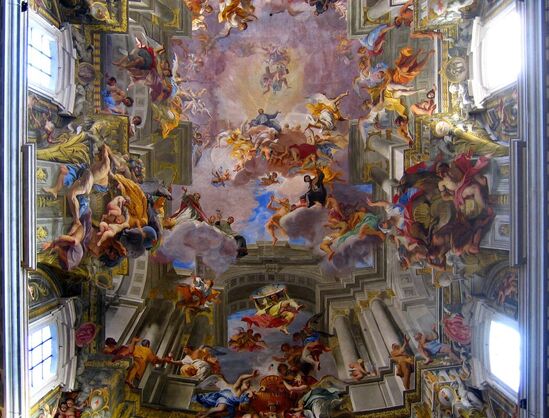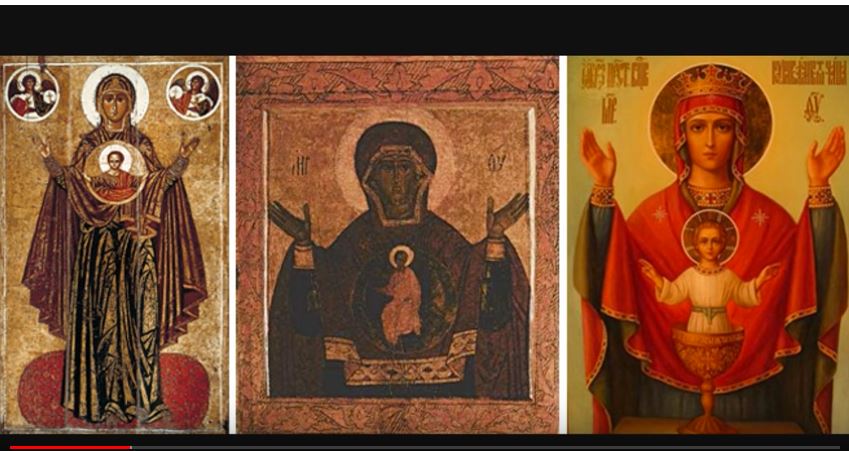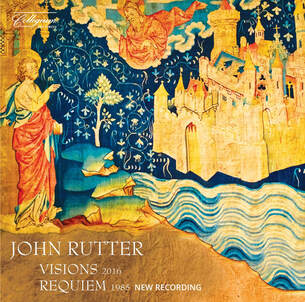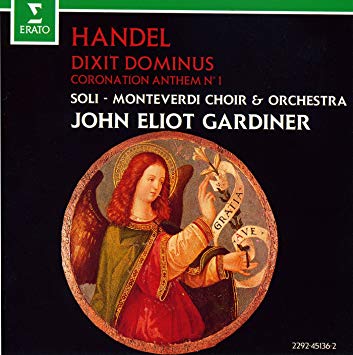St Hildegard of Bingen - the 12th century abbess, writer, philosopher, Christian mystic, visionary, natural historian and polymath -is one of the best-known composers of sacred monophony, as well as the most-recorded in modern history. For Hildegard, music rises almost to the level of a sacrament, channelling the perfection of divine grace from the heavenly choirs. Our featured music this week is her hymn to the Virgin, O Viridissima Virga.
It is sung here by the ensemble, Sequentia, whose founder - Barbara Thornton - was responsible for bringing Hildegard's entire repertory to mediaeval music lovers worldwide.
It is sung here by the ensemble, Sequentia, whose founder - Barbara Thornton - was responsible for bringing Hildegard's entire repertory to mediaeval music lovers worldwide.
|
O viridissima virga,
ave, que in ventoso flabro sciscitationis sanctorum prodisti. Cum venit tempus quod tu floruisti in ramis tuis, ave, ave fuit tibi, quia calor solis in te sudavit sicut odor balsami. Nam in te floruit pulcher flos qui odorem dedit omnibus aromatibus que arida erant. Et illa apparuerunt omnia in viriditate plena. Unde celi dederunt rorem super gramen et omnis terra leta facta est, quoniam viscera ipsius frumentum protulerunt et quoniam volucres celi nidos in ipsa habuerunt. Deinde facta est esca hominibus et gaudium magnum epulantium. Unde, o suavis Virgo, in te non deficit ullum gaudium. Hec omnia Eva contempsit. Nunc autem laus sit Altissimo. |
O branch of freshest green,
O hail! Within the windy gusts of saints upon a quest you swayed and sprouted forth. When it was time, you blossomed in your boughs-- “Hail, hail!” you heard, for in you seeped the sunlight’s warmth like balsam’s sweet perfume. For in you bloomed so beautiful a flow’r, whose fragrance wakened all the spices from their dried-out stupor. They all appeared in full greeness Then rained the heavens dew upon the grass and all the earth was cheered, for from her womb she brought forth fruit and for the birds up in the sky have nests in her. Then was prepared that food for humankind, the greatest joy of feasts! O Virgin sweet, in you can ne’er fail any joy. All this Eve chose to scorn. But now, let praise ring forth unto the Highest! |
Skellig Michael and Little Skellig. Photograph above courtesy of Eoghan Kavanagh.
Sacred Music
Note: many of these video links will open with an advertisement, which can be skipped after a few seconds.
Note: many of these video links will open with an advertisement, which can be skipped after a few seconds.
Te Deum Laudamus in D Major H 14 by Marc-Antoine Charpentier
This the best known of six settings of the Te Deum text by Baroque composer, Marc-Antoine Charpentier. It was probably composed between 1688 and 1698, during Charpentier's stay at the Jesuit Church of Saint-Louisin in Paris, where he held the position of musical director.
Listen here to a thrilling performance by American-born French conducter, William Christie, and his remarkable choral and orchestral ensemble, Les Arts Florissants.
This the best known of six settings of the Te Deum text by Baroque composer, Marc-Antoine Charpentier. It was probably composed between 1688 and 1698, during Charpentier's stay at the Jesuit Church of Saint-Louisin in Paris, where he held the position of musical director.
Listen here to a thrilling performance by American-born French conducter, William Christie, and his remarkable choral and orchestral ensemble, Les Arts Florissants.
The 1986 recording of Rachmaninov's "Vespers" in Smolensk Cathedral, under the direction of Valery Polyansky, is considered one of the greatest. Listen here to the full work. For the lyrics, click here.
|
The great English composer Ralph Vaughan Williams wrote the short anthem, O Taste and See How Gracious the Lord Is for the moment of Communion during the Coronation ceremony of Queen Elizabeth 11. It is sung here by the Cambridge Singers, conducted by John Rutter.
90 seconds. ELGAR – THE SPIRIT OF THE LORD IS UPON ME (The Apostles) The Apostles tells the story of the life of Jesus and his ministry up to the Ascension. The work opens with a Prologue, The Spirit of the Lord is upon me. These are the very words which Jesus reads in the synagogue in his home town of Nazareth when, on the sabbath day, they ask him to read from the scroll of the Prophet Isaiah. They are also the words which begin the public ministry of Jesus. It is performed here by the Hallé Choir and Orchestra conducted by Sir Mark Elder. You can follow the lyrics here. 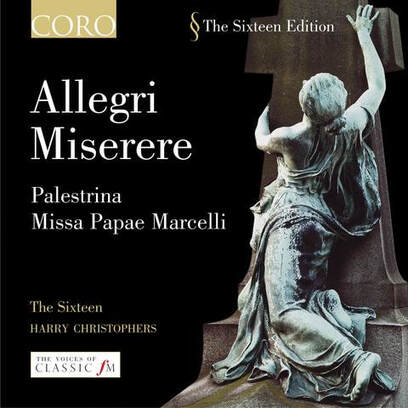
Superb recording of Allegri's haunting Miserere, a setting of the great penitential psalm, Psalm 51, composed in the 1630s. |
The celebrated English composer, John Rutter, composed his Requiem in memory of his father. The work includes this beautiful setting of 'The Lord is my Shepherd' performed here by the Cambridge Singers and the Aurora Orchestra, conducted by the composer. 5 minutes. Tallis’s 40-part motet Spem in alium has been described as one of the most astonishing achievements of the human spirit. It is sung here by the Tallis Scholars. Click on “show more” to reveal the full lyrics and translation. 9 minutes.
Handel was just 22 years old when he composed Dixit Dominus. 'Gloria Patri et Filio et Spiritui Sancto' is the concluding moment of his setting of Psalm 109 (110). It is a tour de force: the interweaving of a single melody sung by five different voices at different times and pitches, yet mingling and combining again and again to create this beautiful praise of God. Performed here by the Monteverdi Choir and Orchestra, conducted by Sir John Eliot Gardiner. 6 minutes. |

